

Www.redesparalaciencia.com/wp-content/uploads/2009/12/entrev49.pdf. Cambiar la formación de los profesores. Cambiar la formación de los profesores Entrevistas de Eduard Punset con Linda Darling-Hammond, profesora de educación en la Stanford University, y con Robert Roeser, psicólogo de la Portland State University. Washington, 9 de octubre del 2009.
Ver la entrevista en video Educar para fabricar ciudadanos. El antiguo modelo de enseñanza ya no es válido en una sociedad basada en el conocimiento ~Linda Darling-Hammond Eduard Punset: Linda, me han dicho, y corrígeme si me equivoco, que al principio, bueno, en 1900, cuando se diseñó el sistema educativo actual, sólo un 5% de los empleos requerían un conocimiento especializado. Linda Darling-Hammond Linda Darling-Hammond:Bueno, según mi experiencia, a los profesores les parece muy bien porque lo que les atrae de la profesión es hacer un buen trabajo con los chicos. Educar para fabricar ciudadanos. Bohm dialogue. Bohm Dialogue "...it is proposed that a form of free dialogue may well be one of the most effective ways of investigating the crisis which faces society, and indeed the whole of human nature and consciousness today.
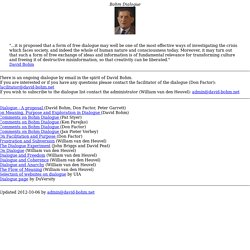
Moreover, it may turn out that such a form of free exchange of ideas and information is of fundamental relevance for transforming culture and freeing it of destructive misinformation, so that creativity can be liberated. " David Bohm There is an ongoing dialogue by email in the spirit of David Bohm. If you are interested or if you have any questions please contact the facilitator of the dialogue (Don Factor): facilitator@david-bohm.netIf you wish to subscribe to the dialogue list contact the administrator (William van den Heuvel): admin@david-bohm.net.
Multicultural Interdisciplinary Handbook Multicultural Interdisciplinary Hanbook. Multicultural Interdisciplinary Handbook Table of Contents 0.
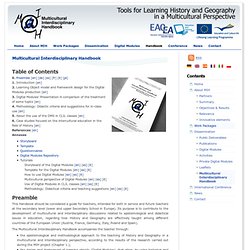
Preamble [en] [de] [es] [fr] [it] [pl]1. Introduction [en]2. Learning Object model and framework design for the Digital Modules production [en]3. Preamble This Handbook should be considered a guide for teachers, intended for both in service and future teachers at the secondary level (lower and upper Secondary School in Europe). The Multicultural Interdisciplinary Handbook accompanies the teacher through: the epistemological and methodological approach to the teaching of History and Geography in a multicultural and interdisciplinary perspective, according to the results of the research carried out during the MIH project (Chapter 1.) In addition, the Multicultural Interdisciplinary Handbook provides to the teacher with suggestions, based on several criteria and strategies for the use of digital modules as learning materials, in order to integrate them into the curricular programmes (Chapter 4.) or used in a CLIL class (Chapter 5.). Alternative Education Resource Organization.
Redes 49: Educar para fabricar ciudadanos. First-Class Citizens: Civics Isn't Just a Class. Did you get one of these?
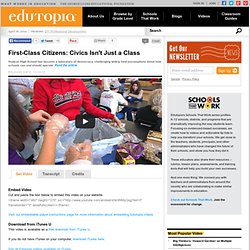
I did. Narrator: Once a month, a group of students and teachers at Hudson High School on the outskirts of Boston meet to discuss school issues. Okay, just a few quick announcements, and then we'll move on to issues of cluster accountability, a report from that team, and the dress code. Narrator: In this community council, when it comes time to vote, students have the final say, over everything from the school's dress code to the menu in the cafeteria.
I'm fuzzy on when there's conflict. These are all simple majority procedures. Okay. Sean: Normally, when you think of the classroom, if the teacher says something, you normally think of it as right, and if a student says something, you always look to the teacher to reconfirm that. The community council decided that there would be no credits, but still, Doctor Berman wanted some sort of accountability. Brian: I'm biting my tongue all the time. A move to a straw vote. Motion passes. Democracy in Action: Students Step Up as Key Decision Makers. These high school students join their newly formed community council and get the chance to help govern their school.
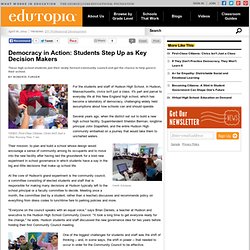
Running Time: 7 min. For the students and staff of Hudson High School, in Hudson, Massachusetts, civics isn't just a class. It's part and parcel to everyday life at this New England high school, which has become a laboratory of democracy, challenging widely held assumptions about how schools can and should operate. Several years ago, when the district set out to build a new high school facility, Superintendent Sheldon Berman, longtime principal John Stapelfeld, and the entire Hudson High community embarked on a journey that would take them to uncharted waters.
Credit: Edutopia At the core of Hudson's grand experiment is the community council, a committee consisting of elected students and staff that is responsible for making many decisions at Hudson typically left to the school principal or a faculty committee to decide. Credit: Channel One News. Student Voice and the Teaching of Democracy. School's out.
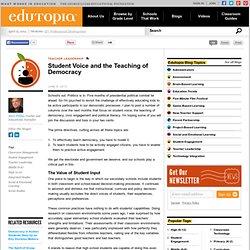
Politics is in. Five months of presidential political combat lie ahead. So I'm psyched to revisit the challenge of effectively educating kids to be active participants in our democratic processes. I plan to post a number of columns over the next months that focus on student voice, the teaching of democracy, civic engagement and political literacy. I'm hoping some of you will join the discussion and toss in your two cents.